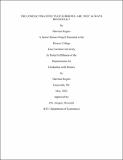THE CONFLICTING EFFECTS OF SUBSIDIES: ARE THEY ALWAYS BENEFICIAL?
Author
Rogers, Harrison B
Abstract
Monetary benefits such as subsidies designed to encourage a behavior often work as one would expect, which is to increase the occurrence of the behavior. However, changing incentives can also have unanticipated consequences and instead reduce that behavior. For my research project, I have worked with Dr. Gregory Howard on researching the effects of subsidies on pro-social behaviors, meaning behaviors that benefit others. The goal of our research is to present the effects of subsides on ECU undergraduate students’ participation in activity that is beneficial. This will allow us to compare the cost-effectivity and efficiency of each combination of subsidies. Our research will use the data of which activities local students choose to participate or not participate in. In our research and previous cases, it is shown that often times subsidies lead to no additional benefits due to participants switching from one beneficial practice to a newly subsidized one. Intrinsic value also leads to subsides having lower effectiveness. Subsidies also face the risk of granting incentives to an activity that a participant would participate in regardless. To achieve our goal, we will measure the additionality of each combination of subsidized practices.
We will analyze previously gathered data on ECU undergraduate students in environmentally beneficial activities. We will use this data to analyze the effect of subsidies on their participation. Next, we will use the data analysis software Stata to analyze the average participation in a practice when it is subsidized against the average of when it is unsubsidized. In conclusion, this research will measure the additionality of each subsidy.
Subject
Date
2022-05-04
Citation:
APA:
Rogers, Harrison B.
(May 2022).
THE CONFLICTING EFFECTS OF SUBSIDIES: ARE THEY ALWAYS BENEFICIAL?
(Honors Thesis, East Carolina University). Retrieved from the Scholarship.
(http://hdl.handle.net/10342/10830.)
MLA:
Rogers, Harrison B.
THE CONFLICTING EFFECTS OF SUBSIDIES: ARE THEY ALWAYS BENEFICIAL?.
Honors Thesis. East Carolina University,
May 2022. The Scholarship.
http://hdl.handle.net/10342/10830.
June 29, 2024.
Chicago:
Rogers, Harrison B,
“THE CONFLICTING EFFECTS OF SUBSIDIES: ARE THEY ALWAYS BENEFICIAL?”
(Honors Thesis., East Carolina University,
May 2022).
AMA:
Rogers, Harrison B.
THE CONFLICTING EFFECTS OF SUBSIDIES: ARE THEY ALWAYS BENEFICIAL?
[Honors Thesis]. Greenville, NC: East Carolina University;
May 2022.
Collections
Publisher
East Carolina University

